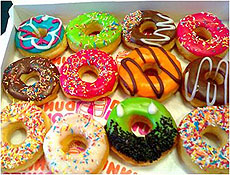Origins of mass: It's not what you think
 |
| The origin of mass in the universe has been worked out. Luckily it's not just the much-maligned donut.
|
If you have even the faintest interest in particle physics, you've heard about the Higgs boson. The Higgs boson is the leading candidate explanation for the origin of the masses of point-like subatomic particles. By extension, the Higgs boson is the origin of mass in the universe, right? There's only one problem with that statement--it's totally wrong.
To clarify, I'm now talking only about ordinary matter. Ordinary matter is the kind that makes up everything familiar to you: you, your mom, the Earth, the stars that seem to twinkle so gently in the clear night sky, but are actually raging thermonuclear furnaces. everything. I'm explicitly not talking about dark matter, which is necessary to explain some astronomical mysteries, but it is totally irrelevant in your day-to-day life.
Ordinary matter is made of atoms. Atoms are made of protons, neutrons and electrons. The protons and neutrons sit in a nucleus, which resides in the center of atoms. Electrons swirl around the nucleus, on the periphery, like a little solar system. Protons and neutrons have about the same mass, so we won't distinguish between them. We'll refer to them by the generic term nucleon, as they are found in the nucleus of the atom. So, if matter is made of atoms, where is the mass located in atoms?
The electrons are extremely light. One nucleon weighs as much as 2,000 electrons. For all practical purposes, the mass of atoms is located in the nucleons.
It is commonly said that nucleons are made of three quarks, which is true to a point. It is logical to think that each quark has one third the mass of the nucleon, but that's not actually true. The mass of the three quarks in the nucleons make up only about one to two percent of the mass of the nucleons. What makes up the other 98 percent?
This is where things get cool. First, you need to know that a nucleon is not a static object with three ingredients. A nucleon consists of three very light quarks held together by the strong nuclear force. Those three quarks are moving at high velocities inside the nucleon. To picture this, imagine three ping pong balls in a lottery machine. Those ping pong balls aren't the most important thing; rather, you should focus on what's forcing them into motion. Think of nucleons as three quark flecks, tossed furiously inside a little subatomic tornado. The tornado is far more important than the tiny flecks.
This is related to mass through Einstein's familiar equation, E = mc2. This equation says that mass and energy are one and the same. From what we know about the mass of nucleons, we see that approximately 98 percent of the mass of the universe isn't mass in the usual way we think about it. Rather, the mass is stored in the energy of tiny subatomic energy dust devils.
How does the Higgs boson fit into all this? While the mass of the nucleons (and, by extension, most of the visible universe) is caused by the energy stored up in the force field of the strong nuclear force, the mass of the quarks themselves comes from a different source. The mass of the quarks and the leptons is thought to be caused by the Higgs boson. It's important to remember that "is thought to be caused" merely means that this is the most popular theoretical proposal. In fact, we don't really know why the quarks and leptons have the masses that they do. That's why the search for the Higgs boson is so interesting. Trying to solve a mystery is always great fun.
However, no matter how interesting the question of the Higgs boson, it's not the dominant source of mass in the universe. Well-understood physics, governed by strong nuclear force is why you have the mass you do.
Well, that and donuts, of course.
Want a phrase defined? Have a question? Email Fermilab Today.
—Don Lincoln
|